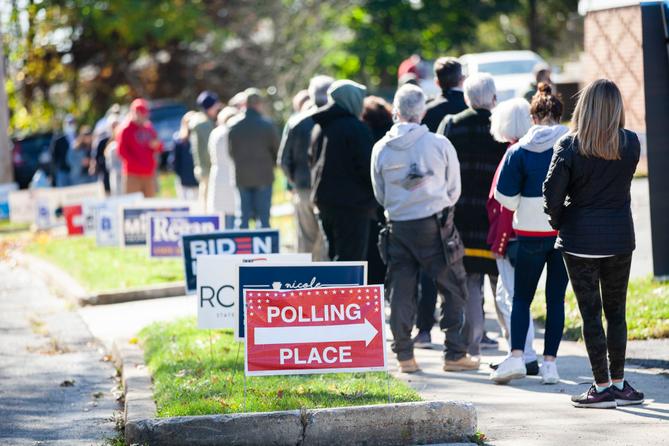Spotlight PA is an independent, nonpartisan newsroom powered by The Philadelphia Inquirer in partnership with PennLive/The Patriot-News, TribLIVE/Pittsburgh Tribune-Review, and WITF Public Media. Sign up for our free newsletters.
HARRISBURG — The U.S. Supreme Court has agreed to consider a case that could reshape election policy across the country, including in Pennsylvania.
At issue is an extreme legal doctrine that would give state legislatures unchecked power over elections and political maps — an idea at least four justices have signaled support for. Here’s what you need to know about the case and what a favorable ruling would mean for the state:
What is the theory?
The “independent state legislature doctrine” is a legal theory that claims state courts do not have oversight power over election policy set by state legislatures.
People who subscribe to this theory assert that courts should not be allowed to intervene in how legislatures draw political lines — even in instances in which they are unfairly drawn for partisan benefit, a practice known as gerrymandering — or weigh in regarding the constitutionality of election laws.
Both issues have been decided in Pennsylvania’s state courts in recent years, with the State Supreme Court selecting a new congressional map in early 2022 and deciding a number of critical cases after the 2020 election.
Which case will the court consider?
The U.S. Supreme Court agreed to take a case from North Carolina during its next session, which begins in October.
In early 2022, a group of voters sued to have the state’s new congressional and legislative maps thrown out for unfairly favoring Republicans. The North Carolina Supreme Court agreed and ordered a lower court to oversee the redrawing of the maps.
The lower court upheld new state House and Senate maps approved by the legislature, but rejected the congressional map and put into place one drawn by a panel of experts it hired.
Legislative Republicans appealed that decision and invoked the independent state legislature doctrine, claiming the state courts didn’t have the authority to interfere.
The U.S. Supreme Court rejected an emergency injunction request in March, but in a dissent, Justices Samuel Alito, Neil Gorsuch, and Clarence Thomas signaled support for the doctrine. Justice Brett Kavanaugh also supported the court’s decision because it was close to an election, but agreed with Alito that the case raised important questions — though he didn’t explicitly endorse the doctrine. In past cases, he has supported limiting state courts’ involvement in elections.
The court rejected a similar emergency request from Pennsylvania lawmakers over the congressional map selected by the state Supreme Court after Democratic Gov. Tom Wolf and the GOP-controlled legislature failed to reach an agreement.
A few weeks ago, the court decided to grant oral arguments for the North Carolina appeal.
Legal scholars in March told Spotlight PA and Stateline that the theory is an inaccurate interpretation of the U.S. Constitution that the U.S. Supreme Court has consistently rejected in past cases.
Chicago-Kent College of Law professor Carolyn Shapiro said the lawsuits are part of a larger effort by state legislatures to strip other branches’ checks on their power.
“The notion that [lawmakers] are freestanding entities to do anything they want in this context is inconsistent with constitutional democracy,” Shapiro told Spotlight PA.
What would a favorable ruling mean for Pennsylvania?
A formal endorsement of the doctrine by the U.S. Supreme Court could reshape the way elections function across the country, giving state legislatures the ability to set voting rules and draw political maps with impunity.
Legal scholars predict that a favorable ruling in the North Carolina case would also give state legislatures the power to reject presidential electors determined by voters and appoint their own slates.
After the 2020 presidential election, many Republican state lawmakers in Pennsylvania attempted to prevent certification of President Joe Biden’s win, citing unsubstantiated claims of widespread fraud.
The Republican nominee for governor, State Sen. Doug Mastriano of Franklin County, introduced a resolution at the time to allow the state legislature to choose its own presidential electors. The measure would have given former President Donald Trump the state’s 20 electoral votes, but the effort died in committee.
If elected, Mastriano has said, he would appoint a secretary of state who would force every voter in Pennsylvania to reregister to vote — something that’s illegal under federal law.
WHILE YOU’RE HERE … If you learned something from this story, pay it forward and become a member of Spotlight PA so someone else can in the future at spotlightpa.org/donate. Spotlight PA is funded by foundations and readers like you who are committed to accountability journalism that gets results.

